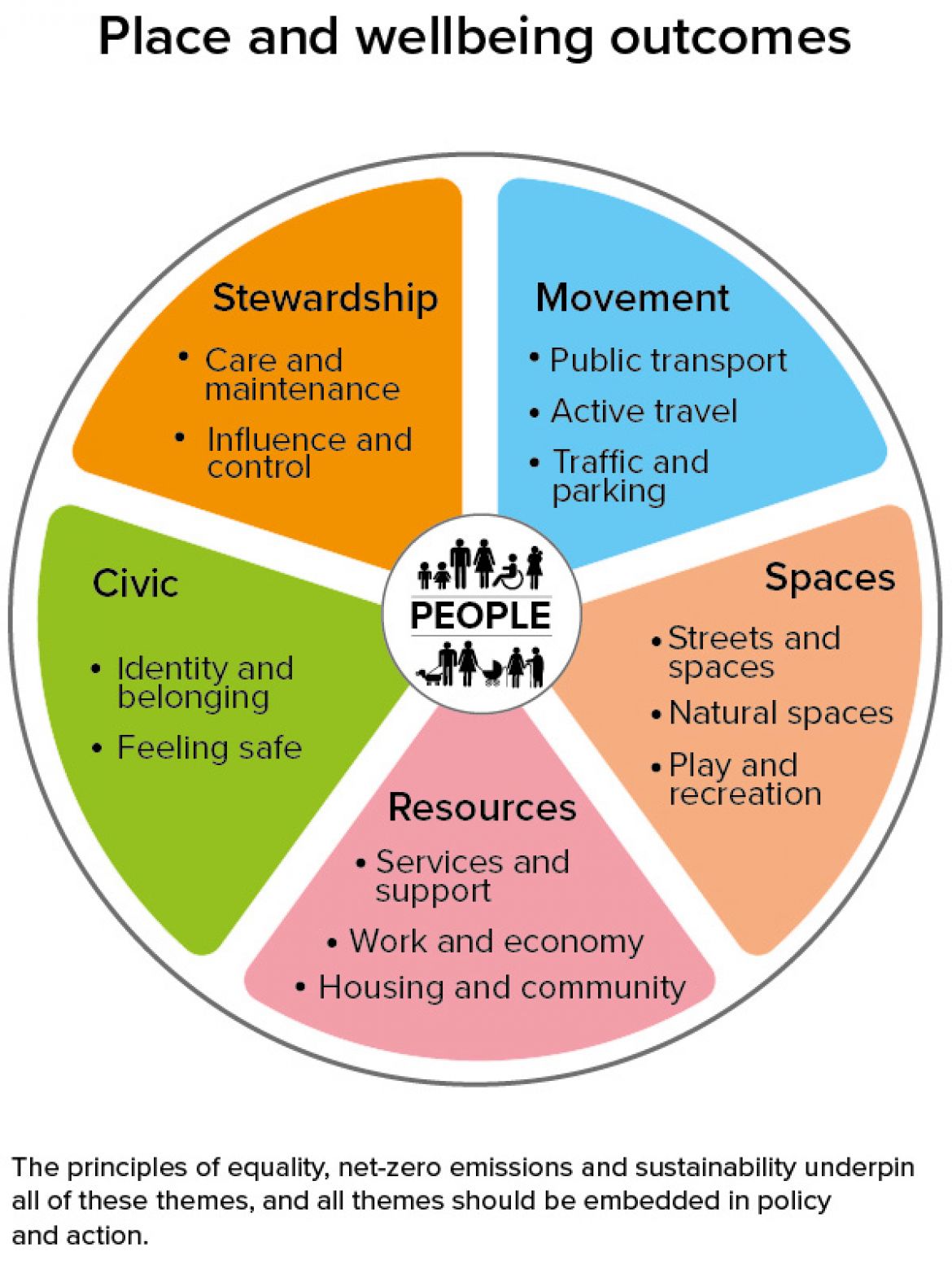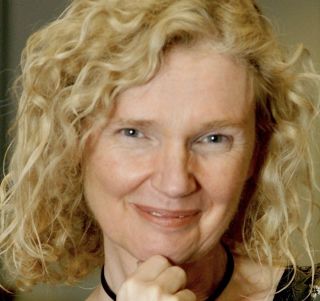The Place and Wellbeing Outcomes provide a consistent and comprehensive focus for where place impacts on the wellbeing of people and planet.
They are also key features for delivering Scotland’s 20-minute neighbourhood ambitions. Their development has been supported by the organisations that sit on the Spatial Planning, Health and Wellbeing Collaborative Group, now named the Place and Wellbeing Collaborative.
More background information and context to the Place and Wellbeing Outcomes can be found in this briefing paper and in the spreadsheet, where you can find the core set of data and the indicators linked to them.
How to use the outcomes
The outcomes support all sectors to focus decision-making and implementation on a common set of evidenced features that make every place.
Local Authorities can ensure they have a joined-up approach to place by embedding the outcomes as part of the decision-making process in policy and implementation. They ensure everyone is working together as part of a whole systems approach and that every aspect of a place is being considered.
We piloted the use of the outcomes at local, council-wide and regional scales to explore the 20-minute neighbourhood ambition. We are now working on guidance for local authorities and other stakeholders to conduct their own ‘Place and Wellbeing Assessment’ using the outcomes.
The work of the Shaping Places for Wellbeing Programme is anchored in using the Place and Wellbeing Outcomes to improve Scotland’s wellbeing and reduce inequality. The programme aims to raise awareness of the outcomes and their use in achieving systems change.

The Place and Wellbeing Outcomes are:
- Movement – active travel; public transport; traffic and parking
- Spaces – streets and spaces; natural spaces; play and recreation
- Resources – services and support; work and economy; housing and community
- Civic – identity and belonging; feeling safe
- Stewardship – care and maintenance; influence and control
The Place and Wellbeing Outcomes are the evidenced features of what every place needs to enable those who live, work and relax there to experience wellbeing.
All outcomes are underpinned by three principles:
Equitable outcomes for all
Each outcome takes account of the needs of different populations and geographies and is applied in a way that ensures they achieve equitable outcomes for all. The impact of policy and practice on the experiences of these different populations within Scotland must be considered. Population groups such as those at the end of the table.
Achieving net zero, sustainability and biodiversity
Each outcome takes account of climate impacts in Scotland and globally and the need to achieve net zero greenhouse gas (GHG) emissions. As well as enhance broader environmental sustainability and biodiversity and are applied equitably in a way that contributes to both greater climate resilience and reduced GHG emissions.
Supporting the system
Each outcome becomes embedded in the right policies and plans both nationally and locally.
Themes and Outcomes
| Theme | Outcome |
|---|---|
| Movement | Active Travel Everyone can:
|
Public Transport Everyone has access to a sustainable, affordable, accessible, available, appropriate, safe, and public transport service. | |
Traffic and Parking Everyone can benefit from:
| |
| Spaces | Streets and Spaces Everyone has access to:
|
Natural Spaces Everyone can:
| |
Play and Recreation Everyone can access a range of high quality, safe, well-maintained, accessible places with opportunities for play and recreation to meet the varying needs of different population groups and the community itself. | |
| Resources | Services and Support Everyone has access to:
|
Work and Economy Everyone benefits equally from a local economy that provides:
| |
Housing and Community Everyone has access to:
| |
| Civic | Identity and Belonging Everyone can benefit from a place that has a positive identity, culture and history, where people feel like they belong and are able to participate and interact positively with others. |
Feeling Safe Everyone feels safe and secure in their own home and their local community taking account of the experience of different population groups. | |
| Stewardship | Care and Maintenance Everyone has access to:
|
Influence and Control Everyone is empowered to be involved a place in which:
|
Each outcome takes account of the needs of different populations groups such as the following:
- Older people, children and young people
- Women, men (including trans men and women and issues relating to pregnancy and maternity)
- Disabled people (including physical disability, learning disability, sensory impairment, cognitive impairment, long term medical conditions, mental health problems)
- Minority ethnic people (including Gypsy/Travellers, non-English speakers)
- Refugees & asylum seekers
- People with different religions or beliefs
- Lesbian, gay, bisexual and heterosexual people
- People who are unmarried, married or in a civil partnership
- People living in poverty/ people of low income
- Homeless people
- People involved in the criminal justice system
- People with low literacy/numeracy
- People in remote, rural and/or island locations
- Carers (including parents, especially lone parents; and elderly carers)
- Staff (including people with different work patterns e.g. part/full time, short term, job share, seasonal)
If you are looking at place-based approaches, or if the Shaping Places for Wellbeing Programme sounds like something you would like to know more about, please contact Irene Beautyman, Place and Wellbeing Partnership Lead, below or follow us on X (Twitter) @place4wellbeing to keep up to date with all of our latest news

Irene Beautyman - Place and Wellbeing Partnership Lead
Phone: 07908 930763
-
Planning for Place Programme
The Planning for Place Programme supports councils and their partners to collaborate around place, seeking to encourage place-based approaches to joint planning, resourcing and delivery of places that enable all communities to flourish.
-
National Planning Improvement Programme
The National Planning Improvement Champion is responsible for monitoring the performance of planning authorities and providing advice to them (and others) on what steps might be taken to improve their performance.
-
Planning Skills
The Planning Skills Programme co-ordinates training events for public sector planning officers, with the aim to develop the skills required to deliver better places.
-
Digital Planning
The Digital Planning team at the Improvement Service collaborates with local government to enhance and unify data related to planning and building standards. This work aims to develop a cohesive national data landscape, fostering insights and supporting informed decision-making.
-
Shaping Places for Wellbeing Programme
The Shaping Places for Wellbeing Programme is a joint delivery partnership between the Improvement Service and Public Health Scotland. This forum is for those interested in our work supporting the role of place to reduce inequality and improve the wellbeing of people and planet.
-
Place Network
For those interested in the importance of place as a working approach to delivering national outcomes around improved wellbeing and inclusive growth.
